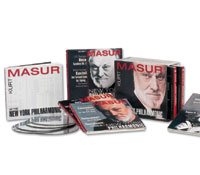
Surely few music directors have received a more generous send-off than the one Kurt Masur is getting from the New York Philharmonic. Either the orchestra is genuinely grateful to its departing conductor for eleven years of faithful service, or some folks feel a trifle guilty about the backstage political disputes that apparently brought the Masur era to a premature end. Perhaps a bit of both. Whatever circumstances may have accelerated the conductor’s approaching exit, all has been forgiven and forgotten in a farewell season awash in sentiment. The most important element, the maestro’s final concerts, reflect his musical tastes and interpretive skills, while the accompanying celebratory gestures are expansive to say the least.
They include Kurt Masur at the New York Philharmonic, the title for both a lovingly edited, 171-page Festschrift published by Random House ($39.95) and a ten-CD box set ($140) that highlights Masur’s tenure in performances of the conductor’s choosing. Handsomely designed and illustrated, crammed with useful information and substantial appreciations from many musicians, the book puts an important conductor into clear and honest perspective. Bound into the book is a CD with selections from the boxed set; one listening should whet anyone’s appetite for the whole thing.
The sixteen works on these discs may not cover every aspect of the conductor’s enthusiasms or strengths, but they touch most of the bases. For those grand gala occasions that any music director must preside over, Masur has generally chosen conservatively, nourishing performances of masterpieces that are part of his own Central European heritage. I wonder how many other high-profile conductors today could make a more eloquent case for performing Bach’s St. Matthew Passion with a modern symphony orchestra and chorus, as well as instilling a similar spiritual fervor and vitality into Beethoven’s Missa Solemnis and Ninth Symphony. Big soloist-and-chorus works with spoken narration have also been memorable Masur specialties, and they are faithfully represented: Honegger’s Jeanne d’Arc au Bûcher, Debussy’s Le Martyre de Saint Sébastian, and Stravinsky’s Perséphone. The humanity and social responsibility that have always been essential ingredients of Masur’s music-making are also reflected in the new works included on these discs, no more so than Hans Werner Henze’s searing choral Ninth Symphony, one German composer’s unblinking examination of his country’s past. There’s much else here worth revisiting, all of it guaranteed to put the Masur years in the best possible light. Both the book and the CDs are available through the orchestra at 800-557-8268 and online at www.newyorkphilharmonic.org.
The Philharmonic is not alone in producing its own compact discs these days, now that the major record companies have lost interest in American orchestras. Philadelphia, Chicago, St. Louis, and Cleveland have all explored their archives and discovered treasures, and the latest to do so is the Boston Symphony, which celebrates the centennial of its home, Symphony Hall, and the departure of its longtime music director Seiji Ozawa with a twelve-disc set of broadcasts dating from 1943 to 2000. The conductors include former music directors Serge Koussevitzky, Pierre Monteux, Charles Munch, William Steinberg, and Erich Leinsdorf as well as Ozawa, along with such frequent guests as Colin Davis, Bernard Haitink, Leopold Stokowski, Dimitri Mitropoulos, Carlo Maria Giulini, Rafael Kubelik, Bruno Walter, Thomas Schippers, and Aaron Copland, nearly all of them conducting music they never recorded commercially.
Just a quick perusal of that impressive roster would be enough to persuade most collectors to contact the BSO at 800-266-1200 or online at www.bso.org and part with $225. Who would not want to hear Bartók’s Concerto for Orchestra, barely a month after its world premiere in 1944, led so passionately by Koussevitzky and with the original ending? As one who grew up with the BSO under Munch, I zeroed in on his authoritative Debussy and Ravel to be reminded once more of how this fabulous conductor’s studio recordings never quite captured the frisson of his thrilling live performances. Even the two Ozawa discs show that variable conductor in the repertory he did best, spicy early-twentieth-century scores like Stravinsky’s Symphony of Psalms, Bartók’s Bluebeard’s Castle, and Messiaen’s Liturgies.
Kurt Masur at the New York Philharmonic
Book and ten-CD boxed set.
Boston Symphony Orchestra
Twelve-CD boxed set.